Key takeaways:
- Eco-tours enhance environmental awareness, connecting participants with local ecosystems and communities while promoting conservation efforts.
- Key experiences, such as snorkeling in coral reefs and kayaking in mangroves, offer insights into the fragility of these habitats and inspire responsible choices.
- Choosing eco-tours entails evaluating sustainability practices, educational value, and opportunities for personal interaction and storytelling.
- Participating in eco-tours creates a positive ripple effect, encouraging broader discussions about sustainability and environmental stewardship beyond the trip.
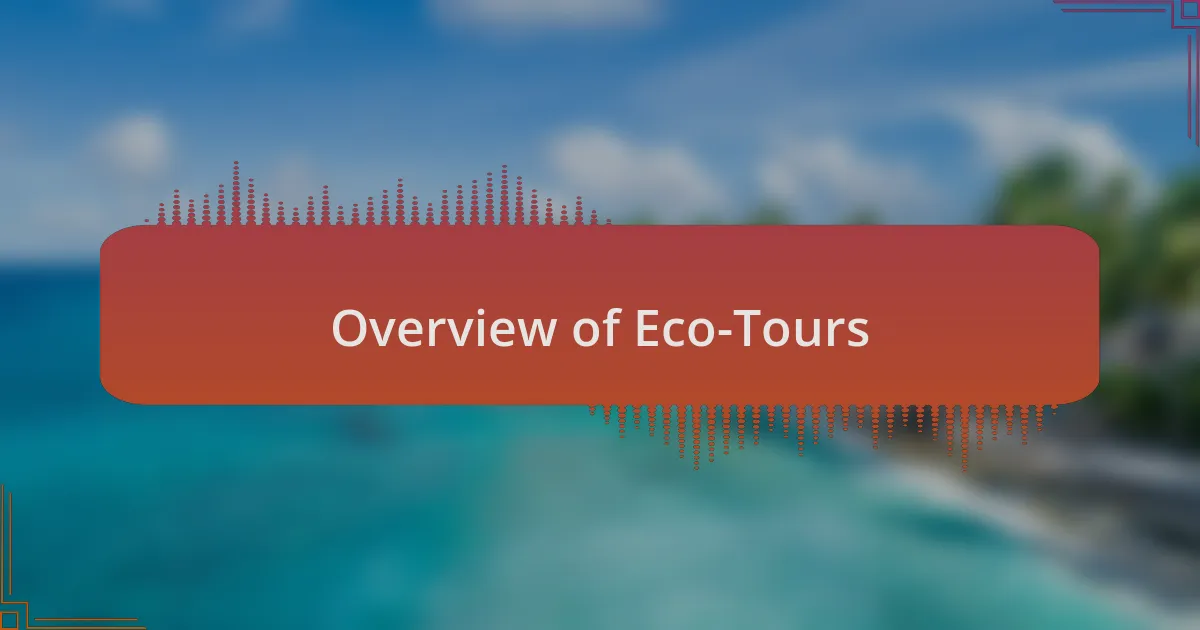
Overview of Eco-Tours
Eco-tours are a truly unique way to experience the natural beauty of the Caribbean. When I first embarked on an eco-tour, I was taken aback by the vibrant marine life and lush landscapes I encountered. This type of adventure often focuses on sustainability and conservation, allowing participants to connect with nature while also learning about the local ecosystems.
What I find particularly captivating about eco-tours is their ability to foster a deeper understanding of our environment. For instance, during a snorkeling trip in a coral reef, I realized how intricate and delicate these ecosystems are. It was eye-opening to witness firsthand the impact of climate change and pollution; it made me more appreciative of the small changes we can adopt in our daily lives to protect these natural wonders.
In my experience, eco-tours often invite introspection and a sense of responsibility towards the planet. Have you ever wondered how much human activity affects wildlife habitats? On one tour, I watched a local guide meticulously explain the symbiotic relationships between plants and animals, which moved me greatly. It reminded me that every action we take can either harm or heal, inspiring me to make more conscious choices in my own life.
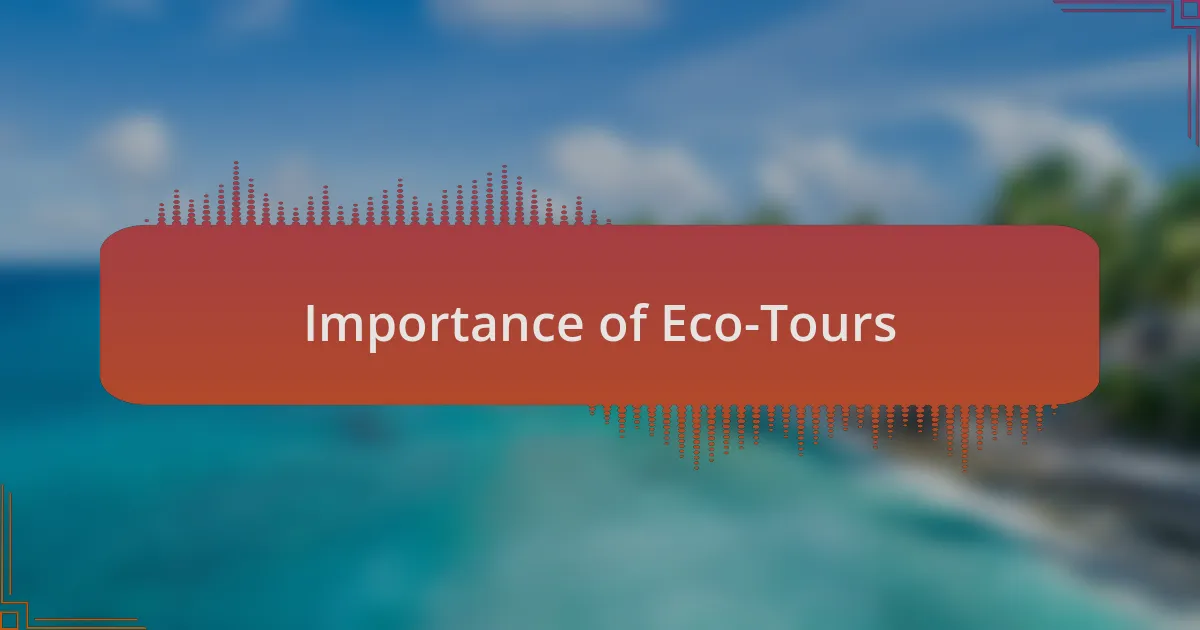
Importance of Eco-Tours
Eco-tours play a crucial role in promoting environmental awareness. During a kayaking excursion through mangroves, I was struck by how vibrant the ecosystem was, filled with sounds and colors I had never noticed before. It made me question how often we overlook the importance of these habitats in our daily lives, even as they work tirelessly to support local wildlife and filter our waters.
By participating in eco-tours, we not only enjoy the incredible beauty around us but also become advocates for conservation. I remember diving with a group that actively participated in reef restoration, and the satisfaction of helping replant coral fragments was profound. It’s incredible how we can leave a lasting impact, transforming our experiences into contributions toward preserving our planet for future generations.
Moreover, eco-tours often highlight the stories of local communities and their relationship with nature. On one trip, I met artisans who crafted beautiful products from sustainable materials, sharing their struggles to maintain traditions in the face of modern challenges. This interaction underscored a vital truth for me: our choices as travelers can resonate far beyond our journey, fostering a positive cycle of respect and support for those we encounter.
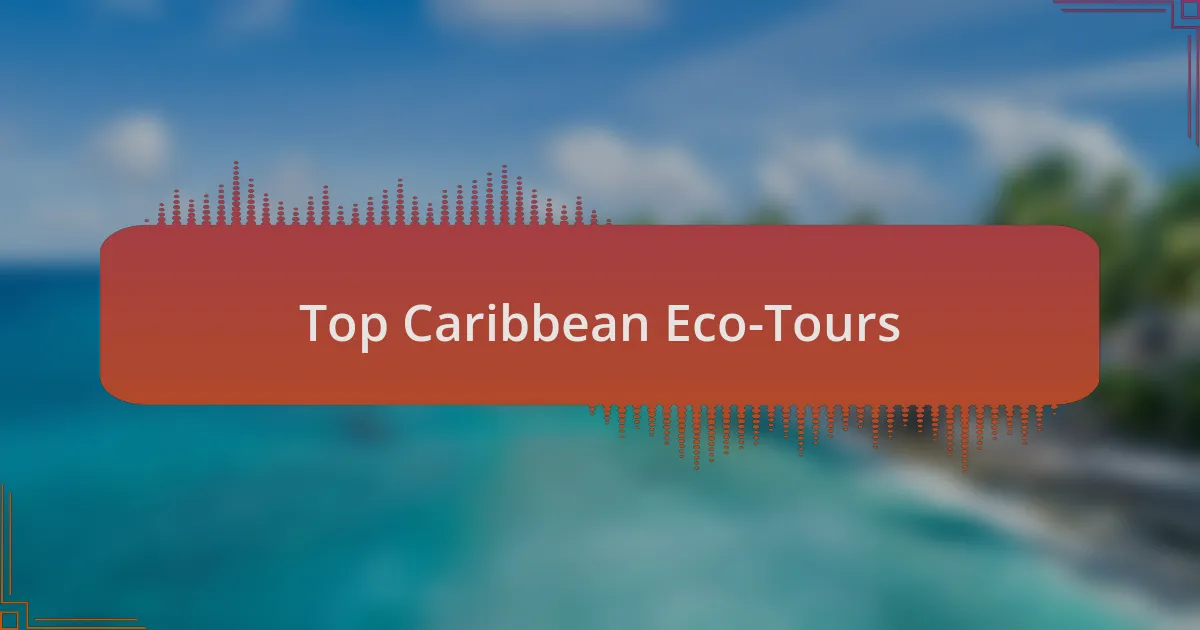
Top Caribbean Eco-Tours
One standout eco-tour that I’ve experienced in the Caribbean is the Bioluminescent Bay tour in Vieques, Puerto Rico. Paddling through glowing waters under a starry sky was mesmerizing, and I still remember the wonder on everyone’s faces as we disturbed the microorganisms that lit up our kayaks like fireflies. How often do we get a chance to witness nature’s magic in such an intimate setting?
On another occasion, I visited the Dominica Rainforest, where a guided hike unveiled the secrets of medicinal plants and the island’s diverse wildlife. As we trekked deeper, the lush greenery surrounded us, and I felt a profound connection to the earth. It was a vivid reminder of how much knowledge indigenous people possess about their environment, and I wondered what other wisdom we might be missing if we don’t take the time to listen.
Lastly, sailing in the waters around St. John provided a unique perspective on conservation. The tour not only showcased stunning coral reefs and marine life but also educated us on the ongoing efforts to protect these fragile ecosystems. Sharing stories with fellow travelers about our hopes for the planet sparked rich discussions, and I realized that raising awareness in such beautiful settings can inspire a deeper commitment to environmental stewardship.
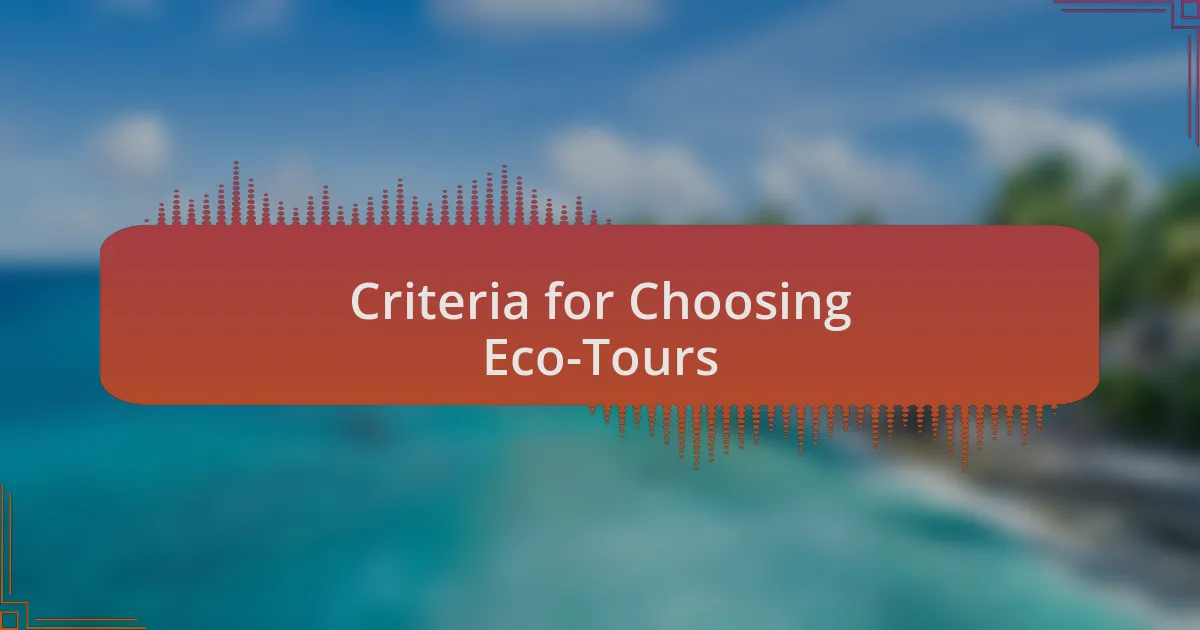
Criteria for Choosing Eco-Tours
When I evaluate eco-tours, I always look for the commitment to sustainability. It’s crucial to choose operators that actively minimize their environmental impact. Do they use low-emission vehicles or rely on local guides? To me, these details speak volumes about their dedication to preserving the natural beauty I’m eager to explore.
Another important criterion is the educational aspect of the tour. It’s not just about admiring picturesque landscapes; I want to learn about the ecosystems I’m exploring and how I can contribute to their preservation. Have you ever left a tour feeling like you gained new insights? I certainly have, and that’s the kind of experience I seek—one that fosters a genuine connection with the environment.
Lastly, the overall guest experience can’t be overlooked. I prefer tours that encourage personal interaction and storytelling, where I can share and bond with fellow adventurers. Isn’t it amazing how meaningful connections often occur in nature’s embrace? The best eco-tours create an atmosphere where every participant feels like they’re part of a shared mission to protect our planet.
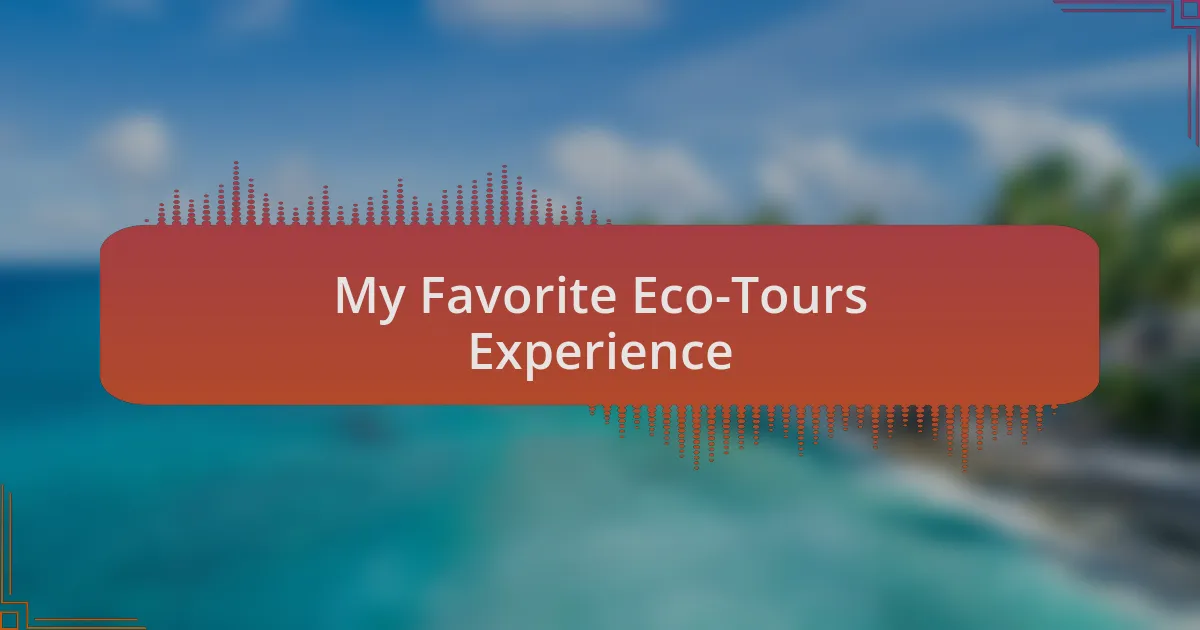
My Favorite Eco-Tours Experience
Experiencing my first eco-tour left an indelible mark on me. I remember sailing through a secluded lagoon, surrounded by vibrant mangroves and the soothing sounds of nature. The guide’s passionate storytelling about the local fauna and flora made me realize how interconnected we are with our environment. Have you ever felt that surge of responsibility to protect such beauty? It’s a moment that stuck with me, and it truly changed how I appreciate nature.
One of my favorite moments came right after spotting a family of manatees gliding gracefully beneath our kayak. The joy of witnessing them in their natural habitat was simply euphoric. I couldn’t help but smile, feeling grateful that these gentle giants had a safe haven to thrive. It was at that instant that I understood the real purpose of eco-tours: to cherish and safeguard our planet’s treasures. Wouldn’t you agree that these encounters open our hearts to nature’s wonders like never before?
Another unforgettable experience involved hiking through a lush rainforest, where the air was thick with scents of earth and foliage. There was a part of the trail where sunlight filtered through the canopy, creating an enchanting display of light and shadow. I found myself utterly captivated, almost in a trance, appreciating the sheer beauty surrounding me. It made me think deeply about my own impact on such landscapes and how essential it is to preserve them for future generations. How could I not be moved by the raw splendor of nature?
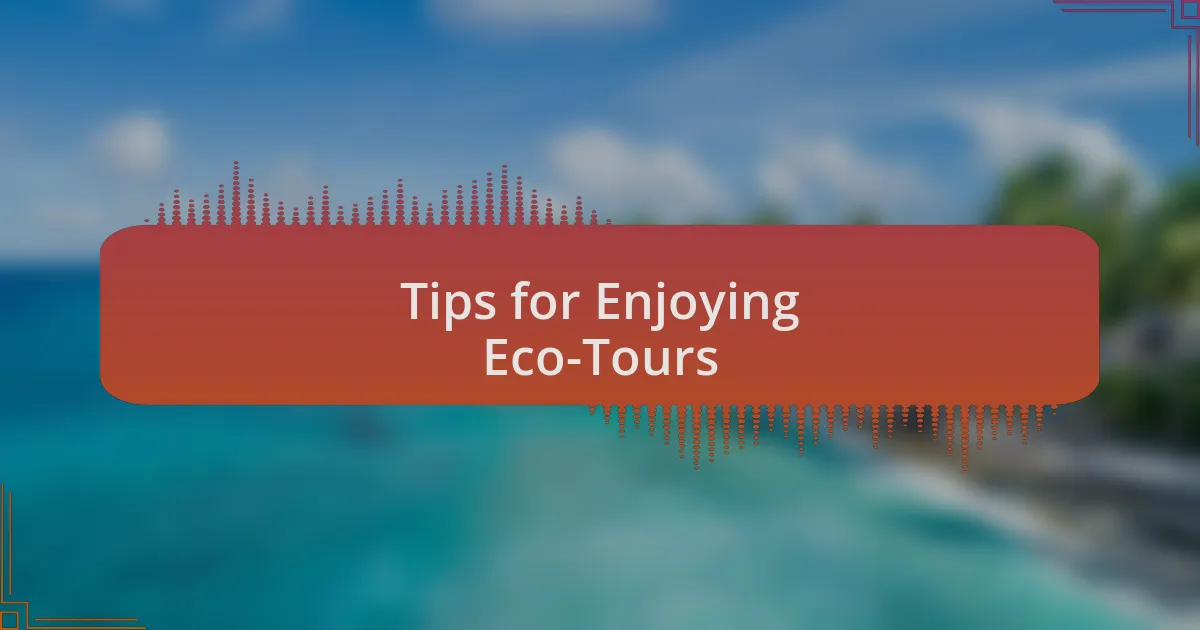
Tips for Enjoying Eco-Tours
When embarking on an eco-tour, I’ve found that preparation is essential. Bring along reusable water bottles and eco-friendly snacks to minimize waste. Have you ever thought about how much single-use plastic we consume? By making small changes, we can collectively lessen our impact, allowing nature to thrive undisturbed.
Next, I like to familiarize myself with the local wildlife and ecosystems before my trip. Just imagine watching a bird and recognizing it as a rare species; it adds a layer of excitement to the experience. To me, it transforms the tour into a treasure hunt, where each discovery deepens my appreciation for the incredible diversity of life around us. Have you ever felt that connection with a place just because you understood its inhabitants a little better?
Lastly, engaging with your guide can elevate your eco-tour experience. I remember asking questions during a mangrove tour, and the guide’s insights revealed nuances about the ecosystem I hadn’t considered. This kind of interaction not only makes the tour more enriching but also fosters a sense of community and shared purpose in environmental conservation. Isn’t it amazing how a simple conversation can change the way we view our natural world?
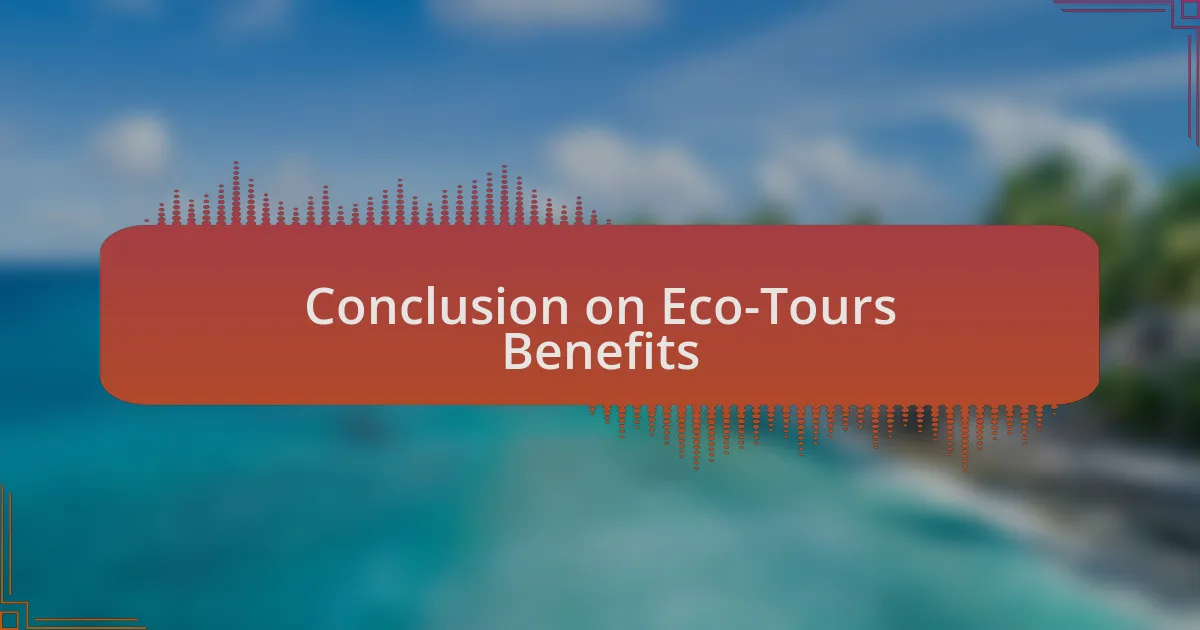
Conclusion on Eco-Tours Benefits
Participating in eco-tours offers far-reaching benefits, both for individuals and the environment. I recall the sense of fulfillment I felt after a day spent kayaking in crystal-clear waters, where I both learned about marine ecosystems and contributed to their protection. It’s inspiring to think that my enjoyment directly supports conservation efforts—how often can a vacation do that?
The educational aspect of eco-tours cannot be overstated. I remember learning about sustainable farming practices during a visit to a local organic garden. Gaining insights into the challenges faced by local farmers opened my eyes to the importance of sustainable choices. Have you ever left an experience feeling not just entertained, but also equipped with knowledge you can share and apply?
Ultimately, eco-tours create a ripple effect of positive impact. I’ve noticed that when I share my experiences with friends and family, it sparks discussions about sustainability and conservation in our daily lives. Isn’t it amazing how a single tour can ignite collective action toward protecting our planet? Each experience adds to a larger narrative of environmental stewardship that resonates well beyond the trip itself.